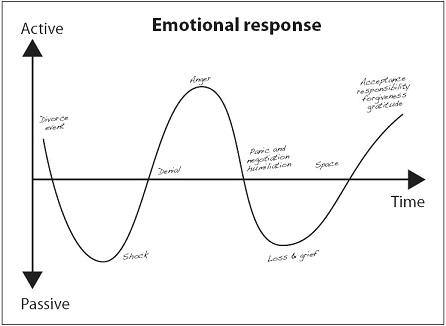

|
|
How to Help Your Staff Going Through Divorce
By Adèle Théron
April 19 2012 - As an HR professional, there are so many ups and downs to your job. Caught up in legal protocols, tons of administration and implementing corporate policies, it's hard to make time for someone when they need help - rather like a soldier asking his colonel for a paperclip whilst on an enemy line!
But, if you remember why you got into HR in the first place, somewhere in there was your desire to help others and be the person they could come to whilst experiencing a crisis - be it personnel or professional. Often at times being caught up in all the distractions of HR, many people don't make the time to create a crisis or advice centre for struggling employees and this is SO needed within the workplace.
What the Divorced Person May Need to Deal With at the Workplace...
Divorce is one of those 'crises' that can completely wipe an employee out. The fog and distraction that goes with coping as best as one can impacts on workplace productivity like nothing else. Bereavement is sometimes easier in the workplace because people rally around to support. There is a level of compassion and understanding that sometimes doesn't take place when someone goes through divorce. Divorce, unlike death is seen as a failure and there is often shame and embarrassment associated to divorce so people end up saying some weird and inappropriate things in an attempt to make you feel better.
With Divorce, People Around Those Going Through it End up Saying Weird or Inappropriate Things
Colleagues often succumb to some old clichés in their struggle to try and make things better. They are all attempts to move people out of their emotional state but these statements are often damaging to overall healing. Common phrases my clients have heard include:
- Thank goodness this happened before you had children.
- God will never give you more than you can handle.
- You’ll find someone else.
- There’s someone special out there for you.
- It’s better to have loved and lost than not to have loved at all.
- Be grateful you were once married and knew love.
- Now you are free to relive your teenage dreams of being single.
These are awful platitudes designed to make people feel better. But they don’t! No one can fix matters of the heart with intellectualisations of the mind. These statements do not encourage healing.
Some want to revel in the drama
Some colleagues will love the drama of their situation. They will ask to know everything about it so that they can revel in the excitement and intrigue of the divorce as a distraction from their own lives. That can be dangerous for office gossip.
People are afraid of catching this disease called divorce so they change the topic
This is why many people experiencing divorce feel very alone. Many of my clients say that they have "caught the disease called divorce and this made them persona-non-grata."
Many false ideas creep into their head. Ideas like:-
- It’s okay for everyone that I feel the pain, but I cannot appear to be floundering.
- I am expected to discuss the divorce with people only once (don’t overdo it as no one wants to hang around with a basket case).
- "I am a failure and I cannot tell anyone in case they think I am a failure at work too"
- "No one at work is divorced, I am alone"
- I mustn’t mope around because it’s not healthy. It also makes people feel awkward.
- But while falling apart, I can’t seem too happy either. That would brand me as insensitive or immature.
What to do to Help Those Experiencing Divorce
Divorce or a really bad break up can be classed as a trauma regardless of how much notice one is given. If we consider the things that help us feel secure in life, our jobs/homes/relationships/family and health are our core foundations.
Going through a divorce or break up, for whatever reason, can come as a shock - even if the person knew it was coming. It’s a massive change and as human beings, we don’t take changes very well. Yes, there are opportunities which arise out of the change but first you need to process the feelings of rejection, grief, anxiety, panic, worry, loss of self esteem (as sometimes the rejection experienced is taken personally) and loss of ‘self’ as you probably linked your self-worth to your relationship.
Many feelings will arise including moodiness, upsetness, depression, anxiety, panic and insomnia. It is very hard to know how best to support someone through the rollercoaster of emotions and if they are your close partner, you will almost feel like you are on the rollercoaster with them.
In the first few weeks, it’s critical for the ‘soon-to-be-divorced person’ to just feel their emotions. Emotions, when fully experienced, naturally evolve along the path of healing but it’s often the people supporting the person being made redundant that interrupt this healing pattern.
TIP # 1: As an HR person, it's important to encourage the person to feel their emotions. Recommend that they take a few days off to deal with whatever is going on.

TIP # 2: Point them to blogs on dealing with divorce whilst at work.
TIP # 3: If they want to find out about the divorce healing cycle, recommend that they take this test: FIND OUT HOW HUNG UP YOU ARE

TIP # 4: Here are a few tips of what to do and what not to do in supporting someone through this change.
Don’ts
Don’t give pep talks. It’s not your job to pump them up and ensure they are happy again. Understand their need to express their emotions Don’t intellectualise their emotions or offer any ‘sage’ advice - telling them to look on the bright side of life or telling them that ‘everything happens for a reason’ just invalidates the pit of despair they are looking into Allow THEM to come to this conclusion on their own – this way, they will own the conclusion on a deeper level Don’t orbit around them or link your own happiness to their happiness – they are entitled to their process and way of dealing with things Don’t tell them to snap out of it Don’t tell them they are being ridiculous, self-indulgent or dramatic They will want to indulge in what I call STEATs (short term emotion avoidance tactics) so they can feel better and run from their emotions. They will want to avoid dealing with their emotions by focusing on decorating, shopping, partying, drinking or being super ‘busy’ with something or other. Rather than rejoice in these activities with them, encourage them to stop and feel their emotions. Validate their right to their emotions. If they engage in STEATs for too Long, they may end up depressed due to repressing their emotions. Do’s
Have compassion. Allow them their feelings and validate their need to process things in their own way Do reassure them that everything will be ok Do show them the divorce emotional cycle and reassure them that they have a right to their emotions and there will be an end to the journey Listen to them Encourage them to bucket (see below) 45 days have passed, if they are still moping around - get them to see someone to process their feelings so that they can move on TIP # 5 Naked Divorce has 21-day kits for people. A corporate box can be created with your company branding on which can be given to anyone going through a divorce to ensure that they have the best possible support they need. Email info@nakeddivorce.com to find out more.
Most important tip - listen and be there for them. Oftentimes they have no support in their life. You might be the only person they can turn to.
And it's at these times, that it's important to remember why you really got into HR in the first place...
About the author 
Adèle Théron - Author, Change specialist, Family Mediator and Divorce Angel - has an 11 year career in helping people cope with change in both the corporate world and within divorce. She used her change management techniques to develop a revolutionary systemised process called the naked divorce for healing from divorce within 21 steps. Adèle has worked with professional men, women and couples as a family mediator, Divorce Angel and divorce programme trainer, helping people heal from break ups, separations and divorce. Today countless people depend on her process to help them heal from divorce. www.nakeddivorce.com
HRM Guide makes minimal use of cookies, including some placed to facilitate features such as Google Search. By continuing to use the site you are agreeing to the use of cookies. Learn more here
 |
|
| Privacy Policy |
|
|